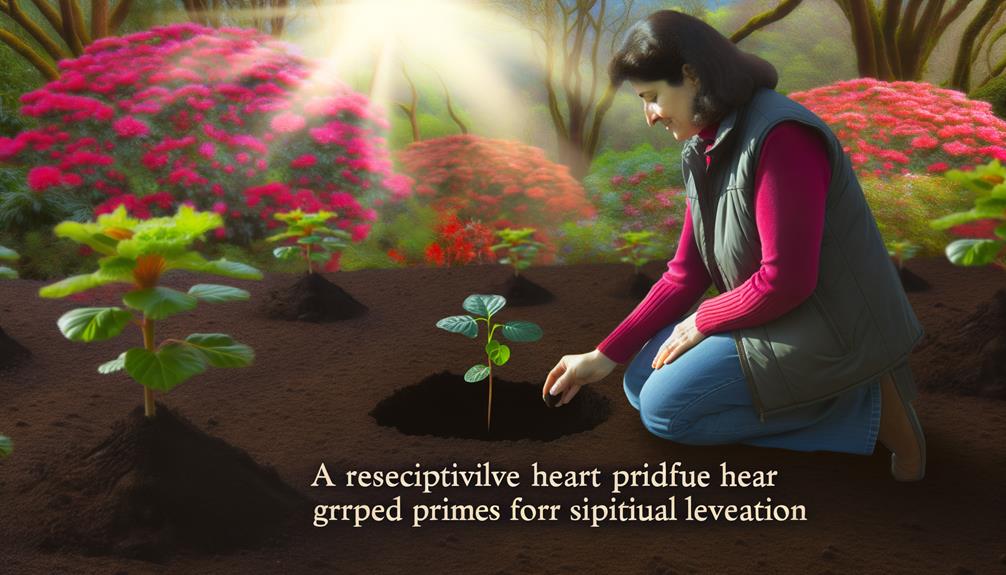Good Soil Meaning in Bible: Receptiveness and Growth
In the Bible, particularly in the Parable of the Sower (Matthew 13:1-23), ‘good soil‘ symbolizes a heart fully receptive to God’s Word. Good soil represents those who not only hear God’s teachings but also understand and apply them, leading to abundant spiritual growth and fruitfulness (Matthew 13:23).
Scripture highlights that qualities like humility (Proverbs 3:5-6), perseverance through trials (James 1:2-4), and a commitment to study and prayer (Joshua 1:8) cultivate this kind of heart. By embodying good soil, we become more fruitful in our spiritual lives.
Explore how you can cultivate such a heart to see transformation.

Good Soil Meaning in the Bible: Symbolism of Receptive Heart, Spiritual Growth, and Abundance
| Aspect | Biblical Meaning |
|---|---|
| Receptive Heart | In the Bible, “good soil” represents a receptive and open heart that is ready to receive God’s Word and truth. It symbolizes those who are willing to listen, understand, and apply spiritual teachings (Matthew 13:23). |
| Spiritual Growth & Fruitfulness | Good soil is a metaphor for spiritual growth, indicating that when the Word of God is planted in a willing and prepared heart, it leads to spiritual maturity and the bearing of good fruit (Galatians 5:22-23). |
| Perseverance & Commitment | It signifies perseverance and commitment, as good soil allows seeds to take root deeply, withstand challenges, and thrive. This reflects a faith that remains steadfast despite difficulties (Luke 8:15). |
| Preparation & Cultivation | The concept of good soil also implies the need for preparation and cultivation. Just as soil must be tilled and nurtured, hearts must be prepared through prayer, study, and repentance to be fruitful (Hosea 10:12). |
| Yielding Abundant Harvest | Good soil produces an abundant harvest, symbolizing the blessings, virtues, and positive impact that come from a life rooted in faith, righteousness, and God’s teachings (John 15:5). |
The Parable of the Sower

In the Parable of the Sower, Jesus uses agricultural imagery to illustrate the various responses to the Word of God, as detailed in Matthew 13:1-23.
As a servant of others, I’ve found this parable deeply impactful. Jesus describes four types of soil: the path, rocky ground, thorns, and good soil. Each represents different heart conditions when receiving God’s Word.
The path symbolizes those who hear but don’t understand, allowing evil to snatch away the message (Matthew 13:19).
Rocky ground reflects those who receive joyfully but fall away under persecution (Matthew 13:20-21).
Thorns depict those choked by life’s worries and deceitfulness of wealth (Matthew 13:22).
This parable challenges us to cultivate receptive hearts for God’s transformative message.
Biblical Interpretation of Good Soil

When interpreting the concept of good soil in the Bible, we recognize it as the heart that not only hears but understands and acts upon God’s Word, leading to a fruitful and transformative life, as emphasized in Matthew 13:23. This parable illustrates the profound impact of genuine receptivity to divine teachings. Such a heart cultivates a deep connection with God, allowing His truths to take root and manifest in everyday actions and decisions. In this context, the ‘good shepherd biblical meaning‘ reveals the relationship between the shepherd and his flock, highlighting the importance of guidance, care, and protection that leads to flourishing lives. Ultimately, just as good soil nurtures seeds to grow abundantly, a receptive heart fosters a community grounded in love and faithfulness, reflecting the character of Christ.
It underscores the necessity of:
- Active listening: Truly hearing God’s Word.
- Spiritual understanding: Grasping the deeper meaning.
- Obedient action: Implementing God’s principles.
- Endurance: Persisting in faith despite challenges.
Each of these elements is essential for cultivating a life that not only honors God but also serves others effectively, embodying the essence of Christian discipleship.
Characteristics of Good Soil

Good soil, according to biblical teachings, embodies a heart that’s receptive, humble, and committed to nurturing the seeds of faith, as exemplified in Jesus’ Parable of the Sower (Matthew 13:23).
A receptive heart enthusiastically listens to God’s word, allowing it to take root (James 1:21).
Humility is essential; it means surrendering my own understanding to God’s wisdom (Proverbs 3:5-6).
Commitment to nurturing faith involves diligent prayer, study, and application of scripture (Joshua 1:8).
Good soil also reflects a willingness to bear the trials and tribulations that come with faith, remaining steadfast and unshaken (James 1:2-4).
These characteristics enable me to serve others effectively, reflecting Christ’s love and grace in all my actions.
Spiritual Growth and Fruitfulness

Spiritual growth and fruitfulness are the natural outcomes of a heart that continually seeks God’s presence and guidance, as underscored in John 15:5, where Jesus declares, ‘I am the vine; you’re the branches.’
When I align myself with God’s will, I experience a transformation that manifests in various ways:
- Deeper understanding of Scripture (2 Timothy 3:16-17)
- Increased capacity to love others (1 John 4:7-8)
- Greater ability to serve selflessly (Galatians 5:13)
- Enhanced spiritual discernment (Philippians 1:9-10)
These fruits not only signify spiritual maturity but also enable me to serve others more effectively, embodying Christ’s love and grace in everyday interactions.
Hindrances to Becoming Good Soil

When I look at the parable of the sower in Matthew 13:18-23, I see that a lack of understanding and worldly distractions are significant barriers to becoming good soil.
Jesus explains that those who hear the word but don’t understand it fall prey to the evil one, while others are choked by the cares of this world and the deceitfulness of riches.
Understanding these obstacles is essential for fostering a heart that truly receives and nurtures God’s word.
Lack of Understanding
One major hindrance to becoming good soil, as Jesus illustrates in the Parable of the Sower, is a lack of understanding, which can be directly linked to the seed that falls on the path and is quickly snatched away by the evil one (Matthew 13:19).
This lack of understanding prevents the Word from taking root in our hearts, leading to spiritual barrenness.
To combat this, we must:
- Seek wisdom through prayer (James 1:5).
- Engage in regular Bible study (2 Timothy 2:15).
- Participate in faith communities (Hebrews 10:25).
- Meditate on Scripture (Psalm 1:2).
Worldly Distractions
Amid the hustle and bustle of daily life, worldly distractions can easily choke the Word, much like the thorns in Jesus’s Parable of the Sower (Matthew 13:22). Our hearts often become entangled with materialism, busyness, and the pursuit of earthly success, diverting us from spiritual growth. These distractions are not merely external but also internal, pulling our focus away from God’s teachings.
| Distraction | Biblical Reference |
|---|---|
| Materialism | Matthew 6:19-21 |
| Busyness | Luke 10:38-42 |
| Earthly Success | Mark 8:36 |
| Worry and Anxiety | Philippians 4:6-7 |
Overcoming these hindrances demands intentional living, prioritizing God’s Word, and seeking His kingdom first (Matthew 6:33). Only then can we truly become good soil, ready for His seed.
Cultivating a Receptive Heart

To cultivate a receptive heart, I must first understand the parable of the sower as found in Matthew 13:3-9, where Jesus describes how the seed that falls on good soil represents those who hear the word and understand it, producing an abundant harvest.
With this in mind, I endeavor to:
- Regularly study Scripture to deepen my understanding of God’s word (2 Timothy 3:16).
- Pray for discernment to comprehend and apply biblical truths (James 1:5).
- Surround myself with a supportive community that encourages spiritual growth (Hebrews 10:24-25).
- Reflect on personal experiences to recognize God’s work in my life (Psalm 77:11-12).
Each step nurtures my heart, making it fertile ground for God’s word.
Lessons for Modern Believers

When I consider the parable of the sower in Matthew 13:3-9, it’s clear that Jesus calls us to cultivate hearts that are receptive to His word.
By nurturing divine seeds through prayer, study, and community, we guarantee that our faith grows robustly, echoing Paul’s charge in Colossians 2:7 to be ‘rooted and built up’ in Christ.
Reflecting on these scriptures, I recognize the importance of faithful spiritual growth in my daily walk with God.
Faithful Spiritual Growth
Understanding the concept of ‘good soil’ in the Bible is essential for modern believers who seek to cultivate a faithful spiritual growth, as illustrated in Jesus’ Parable of the Sower (Matthew 13:3-9, 18-23).
I see how this parable challenges us to examine our hearts and our receptivity to God’s Word.
Faithful spiritual growth involves:
- Daily Scripture Reading: Immersing ourselves in God’s Word (Psalm 1:2).
- Prayer: Consistently communicating with God (1 Thessalonians 5:17).
- Community: Engaging in fellowship with other believers (Hebrews 10:24-25).
- Obedience: Applying biblical teachings in our lives (James 1:22).
Nurturing Divine Seeds
Nurturing divine seeds requires us to embody the characteristics of the ‘good soil‘ by actively cultivating our hearts and minds through disciplined spiritual practices and a deep-rooted commitment to God’s teachings (Colossians 2:6-7).
We must immerse ourselves in scripture, allowing God’s word to dwell richly within us (Colossians 3:16).
Prayer and meditation help align our will with His, enabling us to bear fruit in every good work (Colossians 1:10).
Additionally, we should engage in acts of service, reflecting Christ’s love and compassion. By doing so, we create an environment where divine seeds can flourish, leading others to Christ and glorifying God.
Let’s commit to being the ‘good soil’ that nurtures divine growth in ourselves and others.
Conclusion
As I’ve explored the Parable of the Sower, I’ve realized that becoming good soil means nurturing a heart that’s receptive to God’s word (Matthew 13:23).
Are we truly allowing His teachings to take root and bear fruit in our lives? By cultivating spiritual growth and recognizing hindrances, we can embody the fruitful soil Jesus spoke of.
Let’s aim for a heart that’s open, ready for transformation, and enthusiastic to produce a bountiful harvest in our faith journey.






